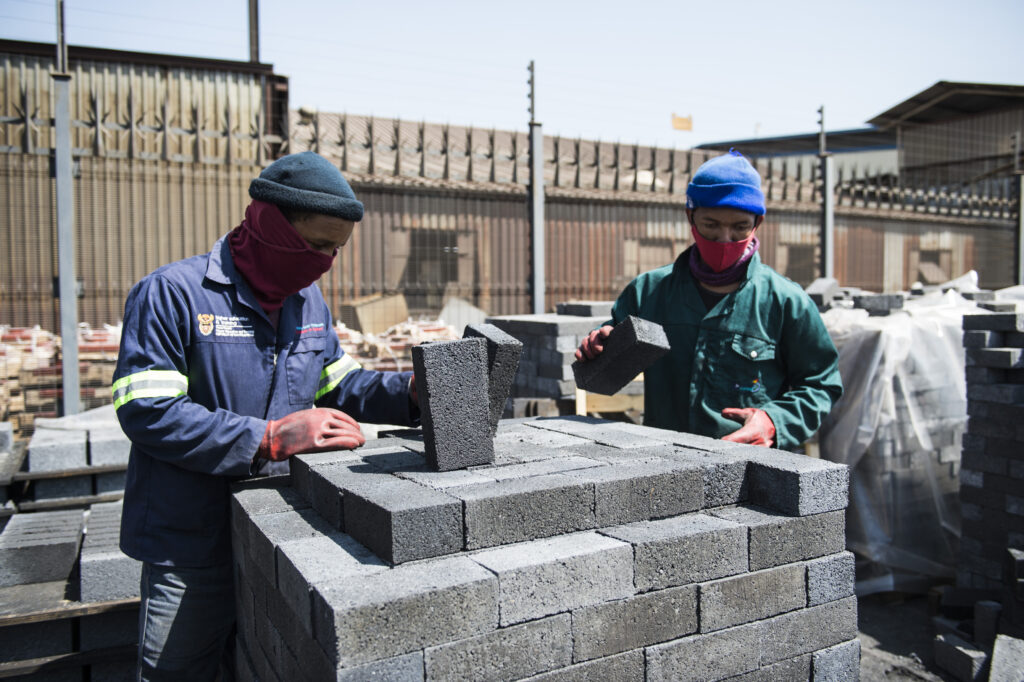Circular green economy: Kekeletso Tsiloane (right) and Kedibone Tsiloane (left) at their factory where bricks are made using plastic, much of it collected from waste pickers. (Delwyn Verasamy/M&G)
Kekeletso Tsiloane has always been “very OCD” about litter. “I’m one of those people where, if I see somebody litter in front of me, I’ll pick it up and give it back to them to dispose of properly,” says the 28-year-old.
It’s this awareness of plastic pollution that led Kekeletso and her older sister, Kedibone, 32, to break new ground in South Africa’s construction industry with their eco-friendly bricks.
Their “strong, durable, fire-retardant and quality” PlastiBrick, made from 30% recycled plastic, has seen the sisters create a circular green economy in the plastic recycling and building material industry.
“The groundbreaking aspect of our technology is that we mostly use non-recyclable plastic that we’re able to process in our brick manufacturing. So you’ll find a lot of the waste pickers working with us because of that,” says Kekeletso.
PlastiBrick is now being sold at the Builders Warehouse stores in Johannesburg’s Rivonia and Fourways suburbs — with more offerings on the way as the company, based in Free State and on Gauteng’s East Rand, grows.
Together, the sisters founded Ramtsilo Manufacturing and Construction, a 100% black, female-owned company and their ecobricks are being used in residential, industrial and commercial projects.
The bricks, Kekeletso says, use less water to manufacture, have a higher compressive strength, are less porous and last longer than conventional bricks.
She and her sister grew up in a “construction household” with their father, Thabo, running a business in the sector. “We would always go on site with him. I would gravitate towards the construction side while my sister would always be on the administrative and business side of things,” she says.
This continued for years but, says Kekeletso: “We didn’t understand at the time what was being cultivated. It was only in 2013, when our father registered a construction business for us, that we started being a bit more active in the business.”
The siblings began manufacturing conventional cement bricks at home and continued working with their father.
Their family home is in Zamdela, a township in Sasolburg in the Free State. “We would always see the waste pickers collecting plastic and we started interacting with them. There’s an elderly lady — we still collect from her — and she told us how collecting plastic and selling it off for recycling allowed her to have access to an income to provide for her grandchildren and herself and also to provide her diabetes medication,” says Kekeletso.
“So we picked up that there is actually value that is created from recycling plastic and that there’s something we can also do to contribute to the reduction of plastic waste. But we didn’t want to stray from what we knew, which was construction.”
In 2016, they started prototyping the use of plastic in brick manufacturing. At the time, Kedibone was working full-time as an auditor in Pretoria, and Kekeletso was running the business.
“Together with my father and brother, we would do the actual experimenting and when my sister came home on a Friday, we would spend the weekend working. We went on for close to a year prototyping different types of plastic because we didn’t know the different types of plastic, the durability and all of that so we had to go through a steep learning curve,” Kekeletso says.
By 2017, they had a product they were comfortable with. “We took it for testing because we wanted to make sure that it’s fit for purpose. Ultimately we wanted to manufacture a brick, which is going to build either a school or a home and had to make sure that it had structural integrity.
“When we got the results back, we were blown away with the brick in comparison. Remember, we had 10 different prototypes we tested so we had to choose the brick that performed the best,” says Kekeletso.
 (Delwyn Verasamy/M&G)
(Delwyn Verasamy/M&G)
By 2018, they entered the market, taking their network of waste pickers with them. “Waste pickers are playing a huge part in plastic recycling but it’s often looked down upon. This is because people don’t really understand the value in what they’re doing — how much money they’re saving for municipalities through their collections — and how they’re kickstarting the circular economy through what they’re doing.
“We would sit with them and teach them how to increase the value of their collected items by separating the different types of plastic and making sure they rinse it out to increase its value. We really tried to bring dignity to that side of the economy because they are playing that important role.”
The company works with more than 50 waste pickers in the Free State and on the East Rand, who supply some of the plastic. The remainder is collected from waste management companies and packaging corporations.
All the plastic waste is stored and processed on their site, ensuring it does not end up in landfills or rivers and drainage systems, says Kekeletso.
“I’m exhausted, but incredibly proud of our product. It’s been a blessed journey. The most important thing is seeing people who hear about the product being open-minded and welcoming.
“We were so scared that people would be against the product because of the fact that it’s got plastic in it but we get so many people who want to learn about it who are calling us and emailing us. It really does create an understanding of the need for each one of us on the planet to do something to make sure our environment is more sustainable,” says Kekeletso.